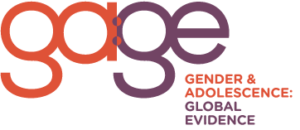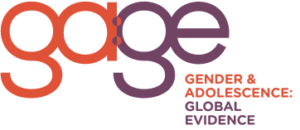Highlighting GAGE
Gender and Adolescence: Global Evidence (GAGE) is a nine-year (2015-2024) mixed methods longitudinal research and evaluation programme following the lives of adolescents in diverse developing country contexts. GAGE will generate new evidence on ‘what works’ to enable poor adolescent girls to emerge from poverty and fast-track social change for themselves, their families and communities and their countries. The programme is funded by UK aid from the UK government.
GAGE aims to understand what programmes are most effective in transforming adolescent girls’ lives. GAGE addresses key questions around programme effectiveness, focusing on the timing, intensity and duration of programmes and their ultimate legacy effects, including the extent to which they reshape gendered social norms.
GAGE will generate unique cross-country data following girls, along with their families and peers (including boys), from early adolescence through to adulthood. Research findings will contribute to the global understanding on programme impacts and what is needed to meet the ambitious targets of Sustainable Development Goal 5, “achieve gender equality and empower all women and girls”.
Why adolescent girls?
Girls have seen remarkable progress over the last two decades. Whereas a generation ago girls were far less likely than boys to go to school, in many countries today, girls are more likely than boys to compete primary school. Adolescence, however, remains a time of great vulnerability for girls in low-and middle-income countries. Due to restrictive gender norms, which become ‘tighter’ as girls experience puberty, adolescent girls are all too often unable to make the transition from primary to secondary school, see their mobility restricted and are forced to marry to suit their families’ wishes. Many girls in developing countries do not have access to any sort of formal employment that would allow them to create their own secure futures and are at significant risk of sexual exploitation and violence. GAGE’s research can contribute to efforts to support adolescent girls to maximise their capabilities and move into the future as purposive actors in their own right – by generating robust evidence on what works, where and why.
Geographical focus
Working in seven different countries, GAGE will follow 18,000 adolescents (including approximately 12,000 girls and 6,000 boys) along with their parents, siblings, peers and community members. Our main longitudinal research will occur in Bangladesh, Ethiopia, Nepal and Rwanda. Their participatory action research, which will include adolescent girls and boys in conflict-affected refugee and host communities, will occur in Gaza, Jordan, Lebanon and the West Bank.
Lebanon – Participatory action research with adolescents who are either part of refugee or host communities. Read more here.
Israel – Mixed methods and participatory action research with adolescents in camp and non-camp settings. Read more here.
Jordan – Mixed methods and participatory action research: with adolescents who are either part of refugee or host communities. Read more here.
Nepal – Mixed-methods longitudinal impact evaluations of programmes aimed at gender transformation for adolescents. Read more here
Bangladesh – Mixed-methods longitudinal impact evaluations of programmes aimed at gender transformation for adolescents. Read more here.
Ethiopia – Mixed-methods longitudinal impact evaluations of programmes aimed at gender transformation for adolescents. Read more here.
Rwanda – Mixed-methods longitudinal impact evaluations of programmes aimed at gender transformation for adolescents. Read more here.
GAGE and the SDGs
There are 1.2 billion adolescents aged 10-19 years in the world today, and how they navigate this crucial life-stage will determine not only their own futures but also the success of the 2030 Sustainable Development Agenda.
GAGE plan on contributing towards the 2030 targets by helping focus attention on the intersection of age and gender, directly addressing adolescent girls. More specifically, GAGE want to help make sure that the most marginalised girls – such as those with disabilities, those from ethnic minority groups, and those living in slum-based communities – are made visible in quantitative and qualitative assessments of progress over time.
While the 17 Goals and 169 targets are now linked to 230 individual indicators, over half of those indicators lack acceptable country coverage, agreed-up methodologies, or both. As the development of cutting-edge tools is one of GAGE’s primary foci, the programme aims to help identify methodologies for measuring specific progress for adolescents, including by gender and age.
Should you like further information or have any questions, contact the GAGE group at gage@odi.org.uk.
Website: http://www.gage.odi.org/
Gage newsletter: Subscribe to the GAGE newsletter to find reflections and photos from the seven countries, interviews, and updates on events that GAGE organised or attended.

